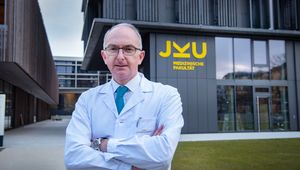University Medicine: Bringing Hope to Treating Congenital Muscle Diseases.

In the past, a genetic muscle disorder would have been considered to be fatal. Thanks to research, Kepler University Hospital now has a gene replacement therapy that, if detected early, allows patients to recover and grow up normally. Julia, 23 months old, is now thriving and despite having been diagnosed with Type 1 spinal muscular atrophy (a very rare genetic disorder that could be fatal within the first year of life), she recently learned to ride a pedal bike. Julia was diagnosed early in April 2021 when she was only one week old and even before symptoms appeared, she was given Zolgensma at the Department for Pediatrics and Adolescent Medicine. Zolgensma, a gene replacement therapy, introduces a working gene into the body using a viral vector in an effort to produce the protein that patients suffering from spinal muscular atrophy lack. Treated early, this revolutionary treatment gives SMA patients a chance to grow and develop normally. Prof. Dr. Wolfgang Högler conducts research on rare diseases at the Johannes Kepler University Linz. We spoke with him to learn more about the disorder and the treatment.
What exactly is spinal muscular atrophy?
Prof. Dr. Wolfgang Högler: A defect in the SMN1 gene results in an irreversible loss of motor nerve cells in the spinal cord, causing progressive flaccid paralysis with muscle atrophy. Depending on the gene defect, there are high to moderate variations of the disease. OÄ Dr. Astrid Eisenkölbl is my specialist at the Kepler University Hospital.
What does the treatment entail?
Prof. Dr. Wolfgang Högler: Only the most severe cases (SMA1) are fatal. The revolutionary gene treatment involves introducing an (inactive) virus vector to a healthy gene into all of the body cells. Once diagnosed, the infant is treated by means of an infusion. However, there are also a number of other treatments available for the severe, moderate and milder cases.
How was this treatment discovered?
Prof. Dr. Wolfgang Högler: Once the mechanism is understood, the drugs can be developed. This is why I concentrate on mechanism research together with my team at the JKU research laboratory. Gene therapy for SMA is only the first of many gene therapies being developed to treat severe cases of hereditary disorders.











